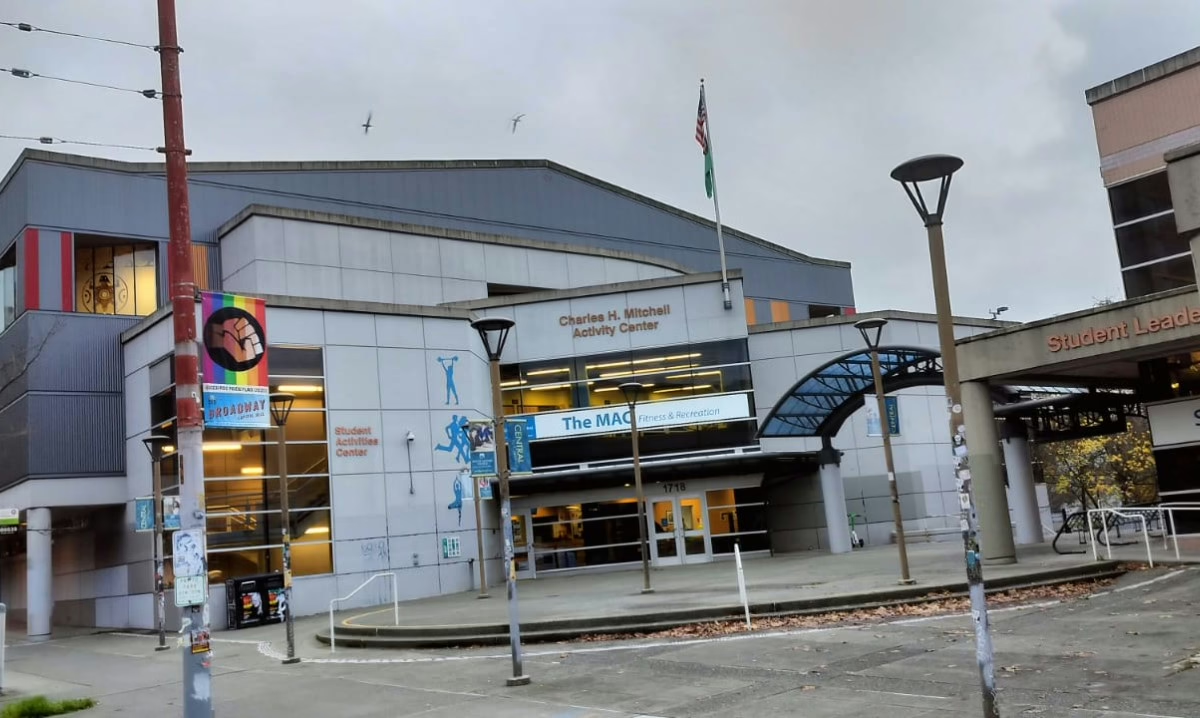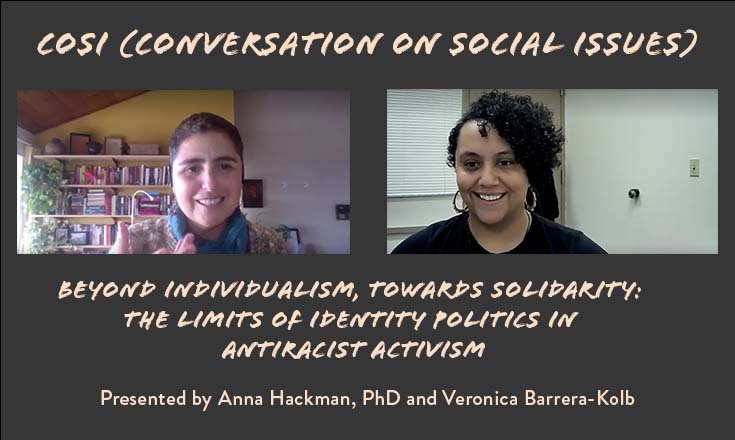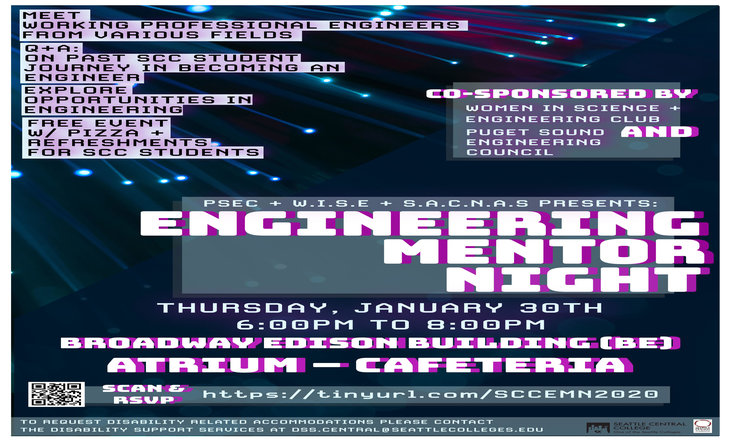Fitness trends on campus: Fitness classes at the Mitchell Activity Center (MAC)
The Mitchell Activity Center (MAC) at Seattle Central College (SCC) has expanded its range of classes, offering classes available to both students and faculty. There are numerous ways to maintain physical health on campus, and this is a big one of them–after all, we must keep up those New Year’s resolutions. But the question is: why should we join these classes?
For starters, they are free for domestic students and included in the tuition for international students under the “Recreation Center Fee.” The classes are provided to the students and faculty for free, but unfortunately, not many take advantage of them. The instructors are paid by the college and are there for the benefit of students and faculty.
These classes were offered in the fall quarter as well, so the MAC team had ample time to figure out what works and what doesn’t. The timings have been assigned with consideration for not only the instructors’ preferences but also those of the students and faculty. The classes are distributed extremely well that they even have classes during the 1 p.m. to 2 p.m. break and after 4 p.m. The class timings are divided very thoughtfully so that if students wanted, they would be able to attend a minimum of three classes every week, each targeting a different aspect of their physical and mental development.
The classes might be for those who do not fall into the typical “gym rat” category and prefer options like dance, yoga, Pilates, and strength training. They are conducted by certified trainers who believe in imparting their knowledge to everyone.
Now let’s see what the instructors themselves have to say about the kind of fitness they teach.
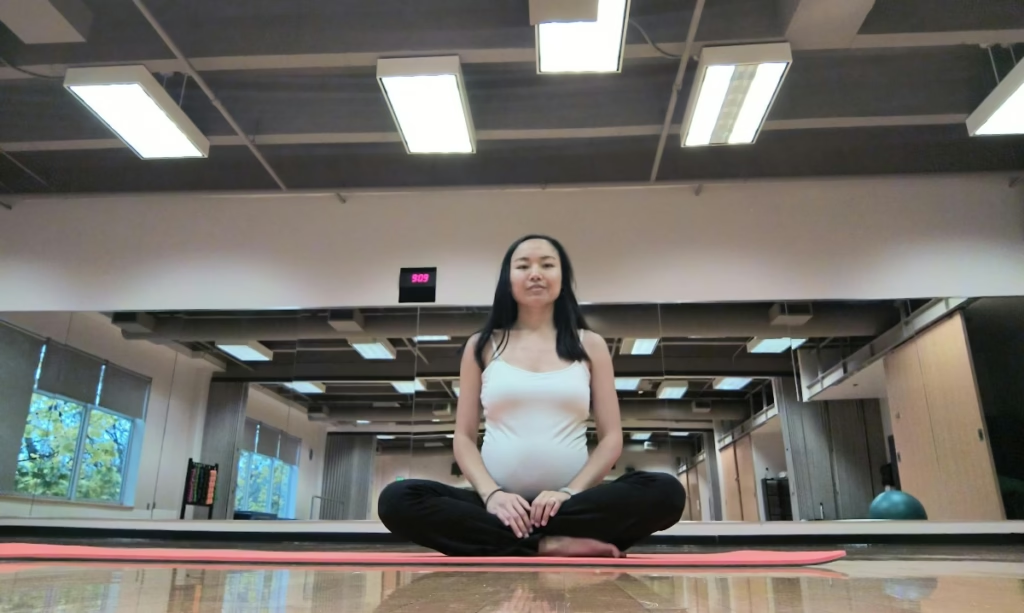
Tsechu Dolma has been a yoga instructor for more than 10 years. “I teach yoga because I want to share this transformative practice with others and help people experience the same sense of balance, strength, and mindfulness that has enriched my life. I’m passionate about making yoga accessible to all, whether they are looking for a way to relax, build strength, or simply find more peace in their everyday lives. It’s an honor to be part of the MAC and the greater Seattle Colleges community. I’m so grateful to share this journey with others,” stated Douma.
She explained that yoga flow, with its focus on breath, movement, and mindfulness, offers numerous health benefits. Physically, it improves flexibility, strength, and balance. The mindful aspect of yoga reduces stress, anxiety, and mental tension, promoting overall emotional well-being. Regular practice supports better sleep quality and a strengthened immune system. Yoga is a holistic approach that nurtures the body and the mind, making it a great complement to other fitness styles. Yoga is adaptable to all levels, from beginners to seasoned practitioners, and offers something for everyone. Whether you’re looking to build strength, increase flexibility, or reduce stress, yoga provides a low-impact, mindful practice that benefits the body and mind. Even if someone doesn’t think yoga is their thing, it can still be worth a try. There’s often more than meets the eye, and people are often surprised by how much they enjoy it and how good they feel afterward. It’s all about finding balance and peace within yourself, and yoga can be a powerful tool in achieving that.
In her classes, Douma begins with a grounding warm-up to center participants and connect them to their breath. They then flow through a sequence of postures that promote strength, balance, and flexibility, often linking breath to movement. She focuses on creating a balanced practice that includes standing poses, balance work, and gentle stretches. There’s always an emphasis on alignment to prevent injury, and Douma provide modifications for those who may need them. Toward the end, they slow things down with some restorative poses to release tension and prepare the body for relaxation. They finish with a short meditation or breathwork exercise to help students leave class feeling calm and centered. “The overall goal is to help students leave feeling more grounded, more connected to themselves, and with a sense of renewed energy,” explained Douma.
“Yoga is more than just physical exercise; it’s a tool for cultivating mindfulness and balance in our lives. I always encourage students to approach their practice with an open mind and heart, allowing the benefits to unfold in their own time. It’s also a space where students can let go of judgment–both from themselves and others’—and just be present. I truly believe yoga is something everyone can benefit from, and I’m so grateful to be able to teach and share this practice with the wonderful community at the MAC Center. Whether you’re looking for a way to relax, build strength, or find a bit more peace in your day-to-day life, yoga can be a great path to explore,” concluded Douma.
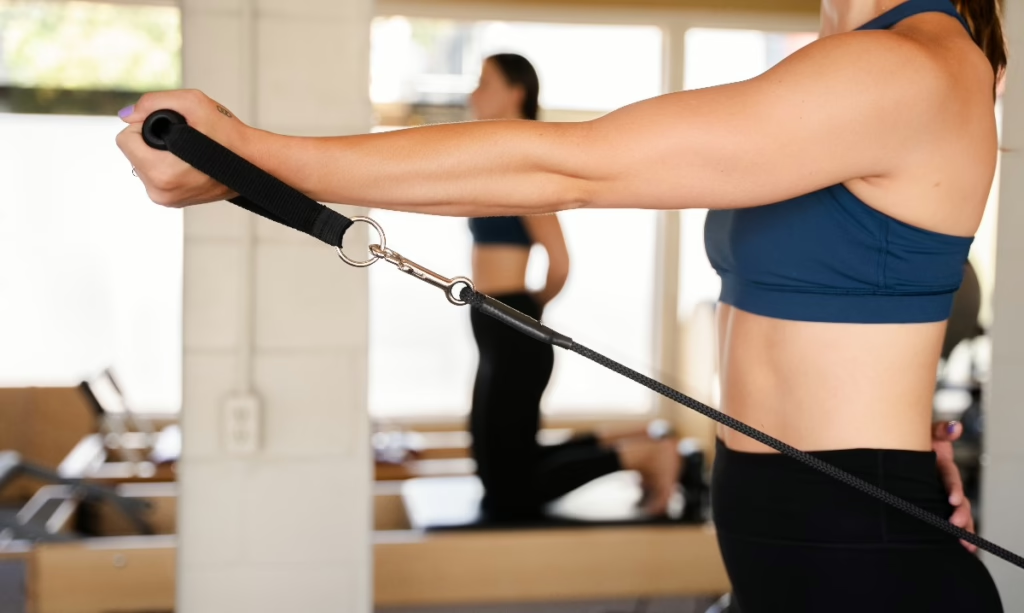
Maya Tacon is a movement and teaching artist based in Seattle. Born and raised in New York, she graduated with honors from SUNY Purchase Conservatory of Dance. Since transplanting to Seattle, Maya has performed for artists such as Cameo Lethem, Jordan Macintosh-Hougham, Michelle Miller, Andy McShea, Joseph Hernandez, and Malacarne directed by Alice Gosti, and acted as Rehearsal Director for Lavinia Vago. Maya is one half of CO-, a collaborative entity that curates and produces dance events, teaches for the worldwide family of Dance Church, and guides professional-level classes for the Seattle dance community. She also holds a STOTT Pilates certification from Bodycenter Studios, and is deeply passionate about facilitating an empowering practice for professional movers and non-dancers alike.
“Here at the MAC, I teach an open-level Pilates Mat class. I discovered Pilates when I was 17 years old and recovering from a knee surgery due to a traumatic dance injury. Pilates was an incredible tool for rehabilitation, and was initially taught to me by both a dance mentor who retired into personal training and Pilates, and a licensed Physical Therapist. I fell in love with how it could be applied to make me stronger and more resilient post-injury, and make my dancing better. I felt so many throughlines between Pilates into dance, and it was a practice that became very important to me. I stuck with it all through my dance training in college, with different mentors and teachers guiding me, and I eventually decided to get certified as an instructor when I realized teaching it could complement my dance career and I could ensure it stayed a part of my life forever,” stated Tacon.
Pilates is an excellent practice to enhance strength, posture, flexibility, endurance, and vitality. “I strongly believe both Pilates and Dance are for every single body, no matter your experience level. Any and all movement is so important for our mental and physical well-being! Pilates builds upon very specific principles and once the foundation is there, you can increase the difficulty of exercises rather quickly. It feels triumphant to accomplish different things and expand the scope of what you think your body can do, with just a little consistency and perseverance. Movement helps us connect to ourselves in such a profound way,” added Tacon.
Her classes, like most traditional Pilates Mat classes, aim to address strength and flexibility to improve posture, balance, and coordination. We focus intentionally on our breath as a guide for movement, improve mobility in the spine, activate the core, and tone all muscle groups to experience a holistic full body workout. The non-traditional flare that Maya adds into the practice is a need for big movement. She integrates individual components into a fast-paced flow that builds heat and endurance. The class size is small enough for assistance that includes feedback and modifications. Maya aims to provide a supportive connection to work collectively in empowering our bodies. No prior experience is necessary, the class lasts about 50 minutes and welcomes all ages.
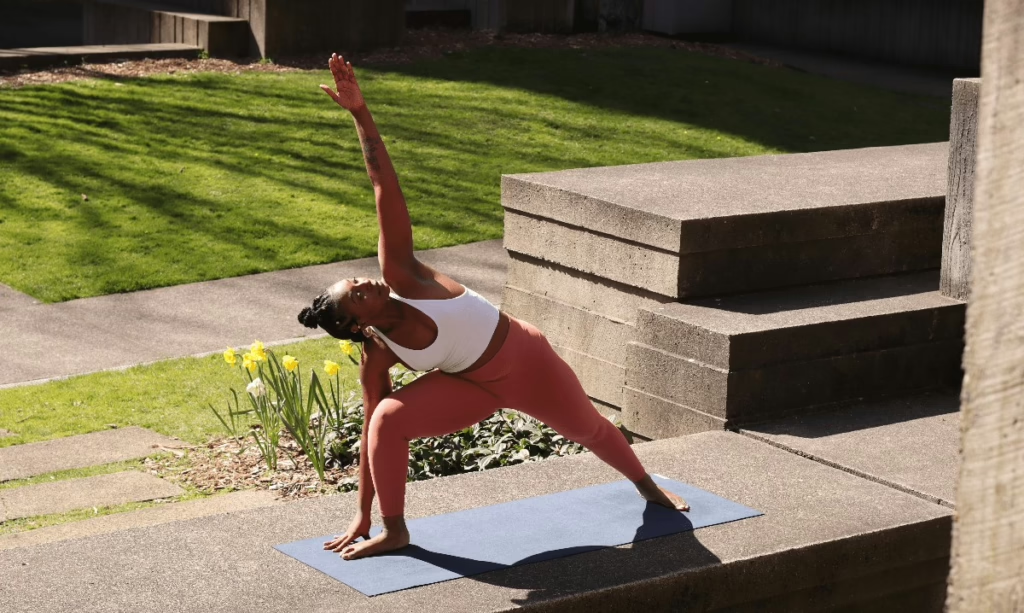
Kimijah is one of the group fitness instructors at the MAC, where teaches three yoga classes a week. Her yoga practice focuses on cultivating focus and deepening self-awareness by tuning into your body, learning to listen to it, and honoring the experience. “I started practicing yoga when I was 20 years old and a student at SCC. A friend of mine who was really into yoga invited me to a class. During my practice, I began experiencing emotional releases on the mat, which led me to process my emotions off the mat as they surfaced. Yoga helped me confront suppressed emotions, and I found myself crying at random times, even when trying to do homework. This experience introduced me to journaling and emotional intelligence, shaping how I approach both my practice and my teaching today,” said King.
The yoga style she teaches offers several benefits. It improves alignment and breath flow, helping align one’s body so that breath and fresh prana can flow more easily into stiff muscles, expanding and releasing them while also aiding in emotional release and mental clarity. Enhanced mind-body connection is another benefit. As King cues for adjustments, the focus is on specific parts of your body, strengthening your awareness, and understanding of oneself. One can get increased self-awareness from learning tendencies in various poses and how to adjust the body, which deepens practice and fosters personal growth.
A typical class at the MAC begins with grounding and connecting to your breath and the present moment. They start with a gentle warm-up to prepare the body, followed by setting an intention for the class. “This is a reminder that we create our life experiences through intentionality and purpose. The rest of the class is a guided, beginner-friendly flow that emphasizes alignment. I provide cues to correct posture, so you can perform poses safely while maximizing their energetic and physical benefits. We usually close the class by reflecting on any changes in your body, breath, or mental state from the beginning to the end of practice,” explained King.
“Yoga can seem challenging at first, but it teaches you valuable skills to handle life’s difficulties. It’s worth cultivating these strengths through your practice. Yoga is not a destination; it’s a journey. We’re always striving to better ourselves, and it’s okay if yoga feels hard at times. What’s important is to keep showing up, growing, and deepening your relationship with yourself through consistent practice,” concluded King.
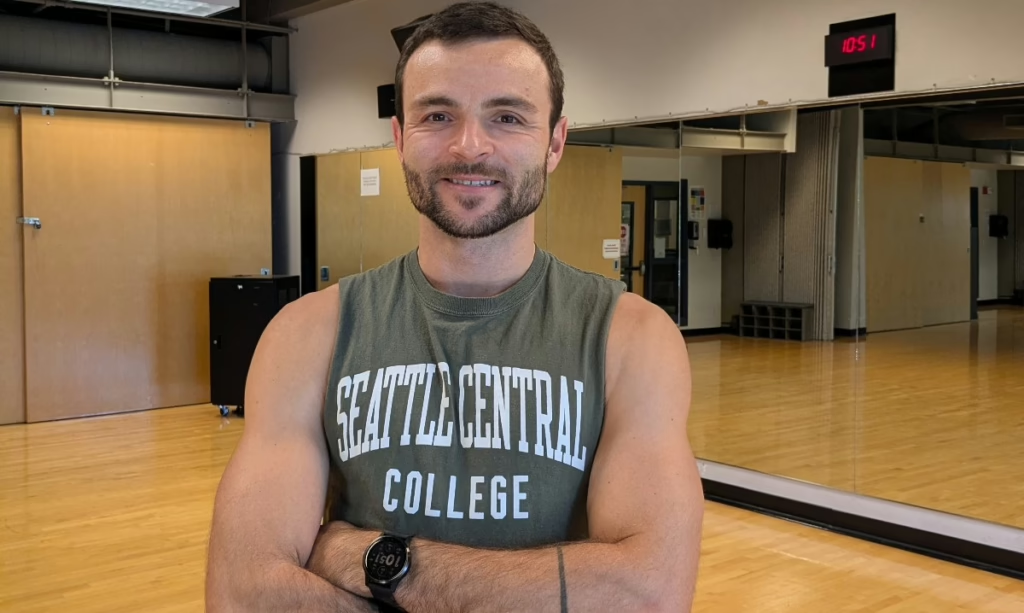
Sandro Herzog, an engineering student at SCC, teaches Strength & Stability classes at the MAC. “Fitness has always been a big part of my life, and a few years ago, I became a certified personal trainer to help others discover the joy of movement and the transformative power of physical activity. Since committing to consistent training, I personally have noticed significant improvements in my mood and energy levels. Staying injury-free in my 30s has been a major bonus, allowing me to fully enjoy an active lifestyle,” Herzog said.
He explained that building strength and improving stability are essential for maintaining a healthy, independent lifestyle. A strong body is better equipped to resist injury, allowing people to enjoy the activities they love well into older age. “My class is designed to help participants establish a solid foundation for lifelong health and resilience,“ stated Herzog. He mentioned that everyone benefits from incorporating more activity into their lives. In today’s sedentary world, finding ways to balance mental and physical challenges is more important than ever, and Strength & Stability training is a fantastic way to achieve that balance.
Each 45-minute class begins with a quick warm-up to prepare the body and ends with a cool-down and stretching session. Herzog’s goal is to challenge every major muscle group during the session. The equipment varies, but dumbbells and a yoga mat form the foundation of every workout.
“The MAC offers an incredible variety of programs, and I hope students take full advantage of them! Whether it is my Strength & Stability class or a session with one of our talented yoga or Pilates instructors, there is something for everyone. Join us and connect with a community of people striving for a more balanced and fulfilling life,” concluded Herzog.
Physical activity facilitates major positive changes in our bodies. Students should appreciate the initiative taken up by the MAC and consider physical activity as a way to boost their physical and mental health.

Vrindha, an international student from India, is fueled by her fervent love for diverse art forms such as dance, drama, music and theatre. Eager to immerse herself in new experiences and broaden her horizons, she sees her involvement with the Collegian as a gateway to both sharing her passions and delving into new realms of knowledge.

